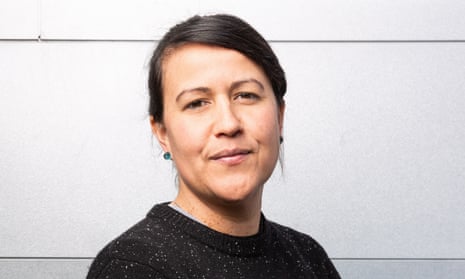Natalie Diaz’s second poetry collection – up for this year’s Forward prize – opens with its title poem, in which past and present blur in an eternal conflict. “The war never ended and somehow begins again,” she declares. Diaz, a US-based poet and MacArthur “genius grant” winner, identifies as queer, Mojave, Latinx, and an enrolled member of the Gila River Indian tribe. In the US, she is, as the minotaur in her poem I, Minotaur suggests, “citizen of what savages” her. To be savaged is to be brutalised by her nation, but also lurking beneath the verb is the savage, a slur for indigenous people.
Conveying clear ideas through crisp, dazzling images, Diaz’s poems typically unfold in long lines grouped into short stanzas. She instructs and inquires; she mourns and rhapsodises. And though she is at the centre of several “wars” – squaring off with institutional racism, her brother’s drug addiction and environmental destruction – she also devotes much of the collection to eros and “wag[ing] love”. She nimbly shifts between English, Spanish and Chuukwar Makav (Mojave language), using vocabulary rich with Greek myth and geology. She shuns the western idea of reality, explaining to the non-Mojave reader in her poem The First Water Is the Body that Aha Makav, “the true name of our people”, means “the river runs through the middle of our body, the same way it runs through the middle of our land”. If this sounds like magical realism, it’s only because “Americans prefer a magical Indian”. She challenges the reader not to see the river-as-body as metaphor, but instead to accept that the fate of the river is the fate of all people: “How can I translate – not in words but in belief – that a river is a body, as alive as you or I, that there can be no life without it?”
Later, in exhibits from The American Water Museum, numbered items demonstrate connections between colonial genocide and environmental destruction. Exhibit 123, called “Marginalia from the BIA Watermongers Congressional Records, redacted” creates a litany of how “to kill”, with a black box redacting the identity of what exactly is being killed. It embodies erased tribes, individuals, land. One command reads: “find their river and slit its throat”.
Diaz laments destruction of the land, and of people. Her American Book Award-winning first collection, When My Brother Was an Aztec, narrated the experience of living with a brother’s mental illness and drug addiction – two conditions caused and compounded by the ongoing effects of colonialism. The brother drifts through Diaz’s latest collection too, a figure of chaos. Defying metaphor, when he appears with a piece of a wooden picture frame he believes is part of Noah’s ark in It Was the Animals, and his visions take control of the scene. Animals enter the house and “two by two the fantastical beasts / parading him” hijack Diaz’s control as sister and writer. She sits helpless, “as the water fell against my ankles”, demonstrating that part of the project of what she calls “postcolonial love” is to remain open and empathetic in the space of devastation.
Diaz’s first book concluded with a short, aching sequence of poems to a lover. This collection is suffused with poems about romantic, erotic love. Ode to the Beloved’s Hips describes how the lover “licked / smooth the sticky of her hip, / heat-thrummed ossa / coxae”. Others move beyond sex and desire, questioning how romance is marred by the coloniser’s gaze. Her poem Like Church quickly turns into a meditation on whiteness: “Her right hip / bone is a searchlight, sweeping me, finds me. / I’ve only ever escaped through her body. What if / we stopped saying whiteness so it meant anything.”
Diaz probes the catch-22 of American racism: as a person of colour, it is impossible to exist without somehow affirming the proscribed fable written for her by the white majority, even when she is alone with her lover: “They think / brown people fuck better when we are sad. / Like horses. Or coyotes. All hoof or howl”. She is trapped by the mythology: “It’s hard, isn’t it? Not to perform / what they say about our sadness, when we are / always so sad. It is real work to not perform / a fable”.
Despite the difficulty of breaking free of this fable, the balance of love poems in this book are truly intimate, electric transmissions from one to another. Queer love defies another myth: the heterosexual, nuclear family. Diaz suggests that intimacy can create a sacred, even holy space, “like church”, an “escape” over which the lovers have dominion. She has written another breathtaking, groundbreaking book, an intellectually rigorous exploration of the postcolonial toll on land, love and people, as well as a call to fight back. In her soaring poems, she deepens and revises the word “postcolonial”, demonstrating not only that love persists in the aftermath of colonialism, but that it provides a means of transcendence, too.
Postcolonial Love Poem is published by Faber & Faber (£10.99). To order a copy for £9.56 go to guardianbookshop.com or call 0330 333 6846.
Emily Pérez is a Ledbury Poetry Critic, a mentoring programme launched by Sandeep Parmar and Sarah Howe with Ledbury poetry festival and the University of Liverpool to tackle the underrepresentation of BAME poets and reviewers in critical culture.
